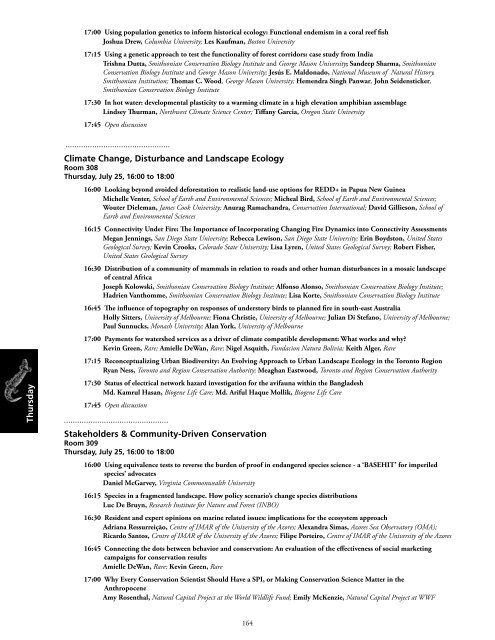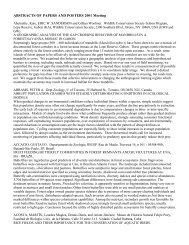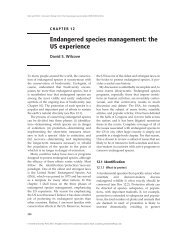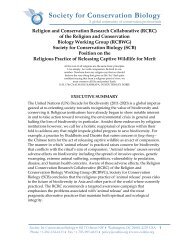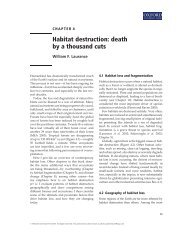ICCB 2013 Program - Society for Conservation Biology
ICCB 2013 Program - Society for Conservation Biology
ICCB 2013 Program - Society for Conservation Biology
Create successful ePaper yourself
Turn your PDF publications into a flip-book with our unique Google optimized e-Paper software.
17:00 Using population genetics to in<strong>for</strong>m historical ecology: Functional endemism in a coral reef fish<br />
Joshua Drew, Columbia University; Les Kaufman, Boston University<br />
17:15 Using a genetic approach to test the functionality of <strong>for</strong>est corridors: case study from India<br />
Trishna Dutta, Smithsonian <strong>Conservation</strong> <strong>Biology</strong> Institute and George Mason University; Sandeep Sharma, Smithsonian<br />
<strong>Conservation</strong> <strong>Biology</strong> Institute and George Mason University; Jesús E. Maldonado, National Museum of Natural History,<br />
Smithsonian Institution; Thomas C. Wood, George Mason University; Hemendra Singh Panwar, John Seidensticker,<br />
Smithsonian <strong>Conservation</strong> <strong>Biology</strong> Institute<br />
17:30 In hot water: developmental plasticity to a warming climate in a high elevation amphibian assemblage<br />
Lindsey Thurman, Northwest Climate Science Center; Tiffany Garcia, Oregon State University<br />
17:45 Open discussion<br />
Thursday<br />
...............................................<br />
Climate Change, Disturbance and Landscape Ecology<br />
Room 308<br />
Thursday, July 25, 16:00 to 18:00<br />
16:00 Looking beyond avoided de<strong>for</strong>estation to realistic land-use options <strong>for</strong> REDD+ in Papua New Guinea<br />
Michelle Venter, School of Earth and Environmental Sciences; Micheal Bird, School of Earth and Environmental Sciences;<br />
Wouter Dieleman, James Cook University; Anurag Ramachandra, <strong>Conservation</strong> International; David Gillieson, School of<br />
Earth and Environmental Sciences<br />
16:15 Connectivity Under Fire: The Importance of Incorporating Changing Fire Dynamics into Connectivity Assessments<br />
Megan Jennings, San Diego State University; Rebecca Lewison, San Diego State University; Erin Boydston, United States<br />
Geological Survey; Kevin Crooks, Colorado State University; Lisa Lyren, United States Geological Survey; Robert Fisher,<br />
United States Geological Survey<br />
16:30 Distribution of a community of mammals in relation to roads and other human disturbances in a mosaic landscape<br />
of central Africa<br />
Joseph Kolowski, Smithsonian <strong>Conservation</strong> <strong>Biology</strong> Institute; Alfonso Alonso, Smithsonian <strong>Conservation</strong> <strong>Biology</strong> Institute;<br />
Hadrien Vanthomme, Smithsonian <strong>Conservation</strong> <strong>Biology</strong> Institute; Lisa Korte, Smithsonian <strong>Conservation</strong> <strong>Biology</strong> Institute<br />
16:45 The influence of topography on responses of understory birds to planned fire in south-east Australia<br />
Holly Sitters, University of Melbourne; Fiona Christie, University of Melbourne; Julian Di Stefano, University of Melbourne;<br />
Paul Sunnucks, Monash University; Alan York, University of Melbourne<br />
17:00 Payments <strong>for</strong> watershed services as a driver of climate compatible development: What works and why<br />
Kevin Green, Rare; Amielle DeWan, Rare; Nigel Asquith, Fundacion Natura Bolivia; Keith Alger, Rare<br />
17:15 Reconceptualizing Urban Biodiversity: An Evolving Approach to Urban Landscape Ecology in the Toronto Region<br />
Ryan Ness, Toronto and Region <strong>Conservation</strong> Authority; Meaghan Eastwood, Toronto and Region <strong>Conservation</strong> Authority<br />
17:30 Status of electrical network hazard investigation <strong>for</strong> the avifauna within the Bangladesh<br />
Md. Kamrul Hasan, Biogene Life Care; Md. Ariful Haque Mollik, Biogene Life Care<br />
17:45 Open discussion<br />
...............................................<br />
Stakeholders & Community-Driven <strong>Conservation</strong><br />
Room 309<br />
Thursday, July 25, 16:00 to 18:00<br />
16:00 Using equivalence tests to reverse the burden of proof in endangered species science - a ‘BASEHIT’ <strong>for</strong> imperiled<br />
species’ advocates<br />
Daniel McGarvey, Virginia Commonwealth University<br />
16:15 Species in a fragmented landscape. How policy scenario’s change species distributions<br />
Luc De Bruyn, Research Institute <strong>for</strong> Nature and Forest (INBO)<br />
16:30 Resident and expert opinions on marine related issues: implications <strong>for</strong> the ecosystem approach<br />
Adriana Ressurreição, Centre of IMAR of the University of the Azores; Alexandra Simas, Azores Sea Observatory (OMA);<br />
Ricardo Santos, Centre of IMAR of the University of the Azores; Filipe Porteiro, Centre of IMAR of the University of the Azores<br />
16:45 Connecting the dots between behavior and conservation: An evaluation of the effectiveness of social marketing<br />
campaigns <strong>for</strong> conservation results<br />
Amielle DeWan, Rare; Kevin Green, Rare<br />
17:00 Why Every <strong>Conservation</strong> Scientist Should Have a SPI, or Making <strong>Conservation</strong> Science Matter in the<br />
Anthropocene<br />
Amy Rosenthal, Natural Capital Project at the World Wildlife Fund; Emily McKenzie, Natural Capital Project at WWF<br />
164


